“Fragile Things”: How ghosts and spirituality make it into writing

"Fragile Things", a reading session and writing workshop, was jointly organised by Sister Library, an initiative of Goethe-Institut Bangladesh and HerStory Foundation, at the Drik Bhavan in the capital's Panthapath. The event, which was held on June 21, featured Iffat Nawaz, the author of Shurjo's Clan (Penguin India, 2023), and was moderated by Katerina Don, Creative Director and Co-founder of CholPori, and by Sarah Anjum Bari, Books and Literary Editor of The Daily Star.
While previous discussions on the book have often been about what influenced Iffat Nawaz to write her debut novel, "Fragile Things" focused on the process of creative writing, especially the process of expressing trauma and writing about important historical events which concern the sentiments of a large group of people.
Speaking about how she was inspired by elements from her own life in her writing of Shurjo's Clan, Iffat Nawaz said, "For me the book is semi-autobiographical, and I think a lot of debut novelists will say the same thing, that we draw from our experiences."
The author mentions "ghosts" that made it into her debut novel, inheritances passed down through memories.
"I grew up in a house in Old Town, where the two uncles of mine, who did die during the war, did have their photos hanging in the study", she recalls of her family, "and it was one of those pictures which, no matter where you go, seems to be following you. Because you know that they are gone, you do feel that I do want to know you but I am also kind of scared."

Writing about '71
Iffat Nawaz's parents belonged to a generation that "wanted to move so far and so quickly, and do so much". They did not want to remain close to the trauma of the Liberation War, the author points out, "but they were carrying it".
"So they were not really talking about it, no one really told me about my uncles' deaths, but I knew that they were killed in a certain way and somehow I pieced it together. When I was old enough to know that I was carrying these things with me, I realised that these were the invisible inheritances I had and that the best way to describe them was through magical realism and ghosts."
Speaking about the process of writing Shurjo's Clan, Iffat shared that her initial draft was very different from the final version.
"I was pouring everything into it—all the stories I had heard about 71, the anger, the resentment—and was pointing a lot of fingers because we grew up pointing a lot of fingers. If you didn't, then you are denying the truth because a lot of it was like 'Pakistan did this, India did that or America didn't support us.'
"And eventually, I thought if we kept saying the same thing, is it going to get better? Do I really want to do this or do I want to do something different? I decided to simplify everything in it and I wanted to make it lighter."
Sarah Anjum Bari, the Editor of Star Books and Literature, shared her own experience of reading Shurjo's Clan. She mentioned how the book, despite dealing with such an emotionally and politically heavy historical issue, brings a light touch.
Commenting on how she managed to deal with the slipperiness of national memory while keeping the tone so tender, Iffat shared that she was reluctant and afraid to touch the history of '71 because of the sentiments involved.
"I kept the history part out of it, I did not use it much. It is described as historical fiction, but I didn't repeat anything. Being a "cultured" child in this country meant that you had to know the right version of everything, but then again I felt I questioned that. What is that right version and how do I edit it for myself so that it is more true?"
As a reader, I myself felt that the book did not engage with the history of the Liberation War in a very direct manner, despite being called "historical fiction". Given how the story of the Liberation War is set in the backdrop and does not attempt to establish any specific versions of the narrative, Iffat Nawaz's story allows the reader to relate to the experience of the book despite their own personal understanding of the history of the Liberation War; this depoliticised the story and allowed it to remain light.

Expressing trauma through writing
The author read an excerpt from the novel in which the protagonist's father dies. Iffat shared that her own experiences of seeing her father pass away in a similar manner—and being able to re-write the incident using fiction—was a liberating experience for her.
Discussing the expression of repressed trauma through writing, she noted that spirituality plays an important role in her experience.
"For me, spirituality and creativity are very much together. I am not really sure how that shift happened, but I think it was when I started doing those 10 days of vipassana courses, where you are silent for 10 days and you have to meditate for almost 10 to 12 hours a day and you fast after lunch until the next morning."
Listening to her speak about the relationship between writing and spirituality made me realise how much dedication writing really takes.
"It's an extreme environment in nature, it is beautiful; it makes you realise all the stories and narratives that make up your identity and who you are really dragging into your space. I think I did four of these 10 days of vipassana courses," she added.
"I am deeply connected to the works of Sri Aurobindo and where I live in Pondicherry, there is an ashram; it is nothing religious, it is about figuring out what is inside you and whether or not you want to let it go or what you want to do. That also helped a lot, especially because in a place where you are anonymous and no one knows you, you can have that space to be. I think I had to be in that space to get to this book."
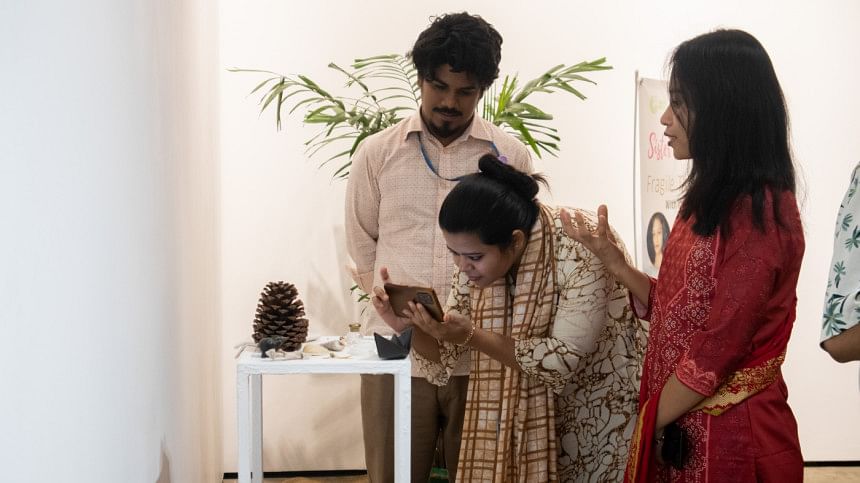
Using memories as a tool to narrate stories
Her words on finding the right state of mind to write and focusing inward inspired the audience present at "Fragile Things" to look inside.
I was able to find the stories I felt I could tell the world as a writer. This idea of spirituality channelling creativity was even better demonstrated in a writing workshop which included a concentration exercise to help participants focus on their memories associated with different objects.
Participants, including the show's hosts and guests, picked up discarded pebbles, photo frames, children's artwork, and other knick knacks—all fragile things collected and displayed by the author.
For me, this was a revolutionary moment, because I have often thought of myself as a poor fiction writer. Attending the workshop gave me the courage to narrate the stories within me and let my imagination and creativity flow.
The enthusiastic crowd, which included people of diverse age groups and professions—from students to budding writers—eagerly participated in the workshop. They wrote poems reminiscing their childhood memories, and even wrote stories which narrated their birth.
"Fragile Things" was the second in a series of events on 'memory' organised by Sister Library (HerStory Foundation and Goethe Institut Bangladesh). The third, and final, Sister Library event on 'memory' will comprise a memoir writing workshop with Abeer Hoque, author of Olive Witch: A Memoir (HarperCollins, 2016). It will take place on July 14 at the Drik Bhavan in Panthapath, Dhaka and is free and open to audiences of age 18 and above.

 For all latest news, follow The Daily Star's Google News channel.
For all latest news, follow The Daily Star's Google News channel. 
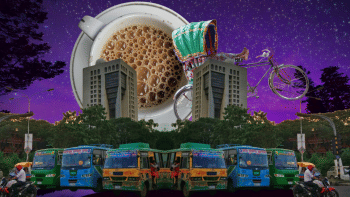



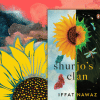

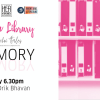
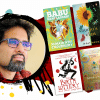


Comments